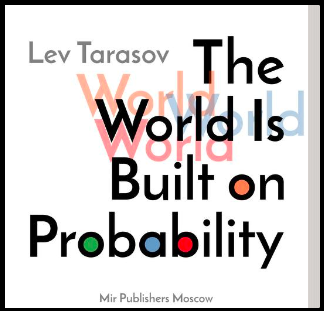
Comments on: https://archive.org/details/lev-tarasov-the-world-is-built-on-probability-mir-2023
https://news.ycombinator.com/item?id=35937375
| FollowingTheDao My Hypothesis: All matter exists in a sphere of probability. Our brains are masters of computing probabilities to tell us the most likely location for any object. It is not that we collapse the wave form, but that our brain ignores the wave form for our convenience.Light is always a wave, never a particle. And a wave is just a probability. |
| imdoor Do you account for the fact that probability distributions can have multiple peaks with equal probability? If multiple brains were involved, they’d somehow have to coordinate on what they deem the most likely outcome. |
| FollowingTheDao Our brains all use the program, but we can see when some of these programs have a glitch. Take some LSD and you will see what I mean.> probability distributions can have multiple peaks with equal probability?I think I know where you are going, but can you be more clear so I do not confuse things with my assumptions? |
| imdoor Say there is a quantum system – a particle or something – that has an equal probability to collapse in either of two classical states if measured. Say there are two scientists in a laboratory who perform a measurement on that system. If your hypothesis is true, how do they agree on what they perceive when looking at the result of the measurement? Each brain would have to make an arbitrary decision on which of the two equally likely outcomes to perceive. |
| pharmakom Our brains would then exist in a state of probability too. |
| FollowingTheDao Yes, they do. But our minds do not. The brain creates the mind, the ego, and this is another collapse of a wave form. |
| goatlover The wavefunction is deterministic. If you take the MWI as the most straight forward interpretation of the math, then the universe if fundamentally deterministic. Probability on a physics level would represent our ignorance of the other branches. reply |
| golol I don’t think you can reason like this. As far as I understodod, standard quantum mechanics does not make any statement about how the measuring process and the collapse of the wavefunvtion happens. So while the waveform evolves deterministically, you can only ever apply this model when you are in the position of performing measurements on some quantum mechanical system. As I understand, Quantum mechanics is not meant to also model you together with the experiment as a wavefunction, because the act of you performing a measurement does not have a definition in the form of the wavefunction interacting with itself somehow. So without extensions to QM, you should not reason with universal deterministic waveforms. reply |
| williamcotton Simplicity of mathematical models at the expense of falsification… who needs science, anyways? |
David Deutsch’s “Physics Without Probability” covers the history of probability, it’s legitimate and misconceived uses and concludes that according to MWI there is no such thing in reality – it’s basically that probabilities correspond to how measures of the multiverse proportion themselves as differentiation occurs.
I watched it a few years ago so may be misremembering bits but I think that is the gist…
Worth a watch especially if you balk at this idea just to to see a strong counter argument.
